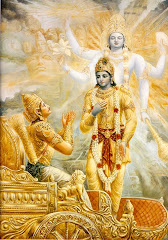
We are approaching the 7th of May... when we will commemorate the 108th birth anniversary of one of the greatest poet and polymath to have walked on this planet - Kabiguru Rabindranath Tagore. He was born on the 7th of May in the year 1861. Therefore, I felt it would be quite apt to write about this lyrical genuis, who is also my favourite poet. To read my other blogs regarding this great poet and polymath and to know more about him, please click on the following link: Tagore (also mentioned under the 'labels' tag on my blog).
"Chitto jetha bhayshunyo" ("Where the mind is without fear") is among one of the most quoted poems in India and Bangladesh.
Written by Kabiguru Rabindranath Tagore before India's independence, it represents Tagore's dream of how the new, awakened India should be. The original Bengali poem was translated by the poet laureate himself and was included in his Nobel prize winning anthology of poems, "Gitanjali" in 1912. "Gitanjali" won him the Nobel prize for literature in 1913, thereby making him the first ever Asian/Non-European to win this prestigious literary award. The Nobel organisation called him a "towering figure in the millennium-old literature of Bengal."
The English version of "Chitto jetha bhayashunyo" is as follows:
Where the mind is without fear..........
Where the mind is without fear and the head is held high
Where knowledge is free
Where the world has not been broken up into fragments
By narrow domestic walls
Where words come out from the depth of truth
Where tireless striving stretches its arms towards perfection
Where the clear stream of reason has not lost its way
Into the dreary desert sand of dead habit
Where the mind is led forward by thee
Into ever-widening thought and action
Into that heaven of freedom, my Father, let my country awake.
Immortal words, indeed! This is Kabiguru Rabindranath Tagore's dream of a free and glorious India. He dreamt of a free-thinking, united and dynamic India. This poem (no. 35, from Tagore's Noble prize winning literary work, "Gitanjali") is very inspiring and timeless.
Here is a link for an audio-visual version of the above poem read by Samuel Godfrey George:
http://in.youtube.com/watch?v=M5OVMrad5iQ
http://in.youtube.com/watch?v=M5OVMrad5iQ
Following is the link to the poem in its musical form (rendered by various artists):
http://in.youtube.com/watch?v=Bh26zOjIh9I
http://in.youtube.com/watch?v=Bh26zOjIh9I
The noted Irish poet and dramatist W. B. Yeats, among others, led the Western appreciation of Tagore, exclaiming of his work in 1912: "These lyrics…display in their thought a world I have dreamed of all my life long," "the work of a supreme culture."
Tagore gave both India and Bangladesh their national anthems, while every branch of modern Bengali literature has been enriched by his extraordinarily diverse works and bears the great polymath's unique legacy.
Photographs:
1. A young Tagore, reading a book.
2. The Bengali version of Tagore's poem "Where the mind is without fear." This poem (no. 35) is from Tagore's Noble prize winning literary work, "Gitanjali."















Geetanjali is y favorite work.Tagore's gratitude to the creator brings tears to one's eyes.His greatness is in his simplicity.
ReplyDeleteThanks for your review and I agree with your thoughts. It is a pity that India has not given this great poet his due...
ReplyDelete